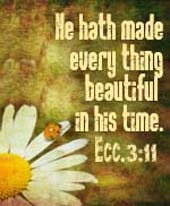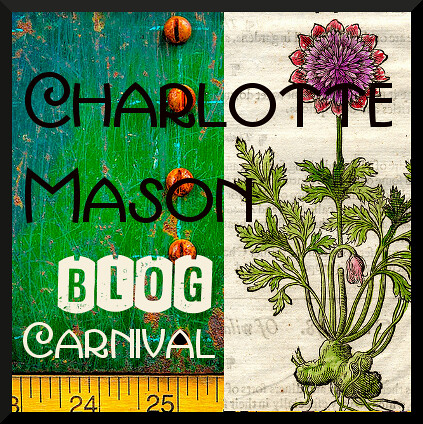
The section I'm talking about today is about one of my all time FAVORITE things out of many of my favorite things that Charlotte Mason wrote about: ideas as mind food. If I weren't the blessed possessor of a smidgen of self-control, you my readers may have been blessed by my having gone wild highlighting and commenting on the entire section this time, but I decided to rein myself in. I hope you'll be more glad than sad about that. Either way, sit back and enjoy, 'cause this could end up long... ;)
A mind must eat, and it is sustained on ideas. Hey wait, I've talked about this before. Whaddya know?! So did Charlotte, matter of fact, she talked about it a LOT. Because for her, it was that important. And really, it could be the most important part of education, since without such there would be none.
A mind feeds on ideas, just like the body needs food, or the locomotive needs fuel. Without fuel an engine quits. Maybe it can run on fumes for a second or two, or you could get behind it and PUSH! Or hook a body up to an IV, but those are artificial or extenuating circumstances at best, and not intended to be the way things go on forever. In the same way that lacking food a body won't function, a mind will not grow without sustenance.
“We know that food is to the body what fuel is to the steam-engine, the sole source of energy; once we realise that the mind too works only as it is fed education will appear to us in a new light.”
While a body may continue for a while on junk food, or a mind on twaddle, is that a justifiable excuse for making of these a regular diet? We all know that sawdust isn't good for us. Yet, we may have heard of times of severe drought and extreme economic distress when people have had to survive on less than nothing, making bread from tree-bark, and things not meant for human consumption. But if this persists, it follows that there will be resulting problems... perhaps with lasting or even permanent effect.
“The body pines and develops humours upon tabloids and other food substitutes; and a glance at a 'gate' crowd watching a football match makes us wonder what sort of mind-food those men and boys are sustained on, whether they are not suffering from depletion, inanition, notwithstanding big and burly bodies. For the mind is capable of dealing with only one kind of food; it lives, grows and is nourished upon ideas only; mere information is to it as a meal of sawdust to the body; there are no organs for the assimilation of the one more than of the other.”
So, ideas. Amazingly powerful things, those.
Tell me, has something like one of the following examples ever happened to you?
Idea = seed. (maybe you remember something because of a smell, or song...)
The Seed is watered. (maybe that song reminds you of a person which reminds you of 8th grade, which reminds you of your English teacher who cried in class, which reminds you that it's amazing that Shakespeare speaks to all types, even those with whom you never thought you'd have a single thing in common, which leads you to think... you get the picture, right? Ideas are alive. We experience this daily.)
The Seed gets sun. (okay, switching ideas in the middle of this illustration, I hope you don't mind... So, say you found a butterfly. The butterfly had cool patterns that looked like camouflage eyes. Then within a day or two, you see someone's posts on fb about Maria Sibylla Merian who lived in the 1600's and sailed from Germany to S.America to document insects and get this... butterflies. You look up her amazing sketches and find one that looks super similar to that butterfly you found earlier (see image at the top of the post!) and looking around further, you learn that as a result of that face-like-camo, it's named after an owl. Cool. A couple weeks later, you read about someone else who who also sailed to S.America around the same time... could they have sailed on the same voyage as Ms. Merian? Could they have met? And once again the idea tap starts flowing... and we could go about the methodical pursuit of this addictive 'idea trail' in various and sundry ways.).
The point is, ideas are the fuel we start with. Consumed and digested, they are what cause our minds to expand and grow. Let's get us some more of them!
"From the first or initiative idea, as from a seed, successive ideas germinate." "Events and images, the lively and spirit-stirring machinery of the external world, are like light and air and moisture to the seed of the mind which would else rot and perish." "The paths in which we may pursue a methodical course are manifold and at the head of each stands its peculiar and guiding idea.”
So, our kids are mini-us's. Their minds are made to feed off of ideas in the same way ours are! When they are little, it doesn't seem to matter what we think of their minds. If we misunderstand and start out by thinking they are just like a big empty bucket waiting to be filled up with letters and sentences and math facts and bible verses and dates and songs and facts and stuff, regardless of how we think of them, it will always be those same idea-stuffs that he happens upon that his mind will feed upon. He'll take what he needs of these, and all the extras will be forgotten or lost. The worst that could happen, is that all this dead weight bucket material might cause him to faint or to stumble, from which while he is yet very young, he can still probably recover. But let's not settle for fodder or filler! Let's do better! What we feed our very young children matters! Let's nourish their budding minds with the BEST!
“In the early days of a child's life it makes little apparent difference whether we educate with a notion of filling a receptacle, inscribing a tablet, moulding plastic matter, or nourishing a life, but as a child grows we shall perceive that only those ideas which have fed his life, are taken into his being;all the rest is cast away or is, like sawdust in the system, an impediment and an injury.”
Now. What about the bits that LOTS of people, including myself in my youth, have had a mind to think are unbearably boring and void of living matter, like Math? And Science? There's so much memorization of Latin names and body parts and tables and elements and formulae and hypotheses and lab book entries... We might admit, if it weren't for such an immense body of facts, it would be absolutely FASCINATING. Add some tidbits about the lives of the scientists or mathematicians and their personal dedication, struggle and sacrifice and it would be RIVETING. Why doesn't run-of-the-mill education do that for our children?
"'Scientific truths,' said Descartes, 'are battles won.' Describe to the young the principal and most heroic of these battles; you will thus interest them in the results of science and you will develop in them a scientific spirit by means of the enthusiasm for the conquest of truth . . . How interesting Arithmetic and Geometry might be if we gave a short history of their principal theorems, if the child were meant to be present at the labours of a Pythagoras, a Plato, a Euclid, or in modern times, of a Descartes, a Pascal, or a Leibnitz. Great theories instead of being lifeless and anonymous abstractions would become living human truths each with its own history like a statue by Michael Angelo or like a painting by Raphael."
Okay, so even the boring bits might be interesting if they weren't presented as a dry list of facts, or force-fed to be memorized and spit out on a test. But, how? Clothed with story. With Books, Biographies, works of Historical Fiction that bring the time period to life, dressing the naked idea with all kinds of sumptuous details and interesting facts... painlessly. The idea grows and the mind is fed, and the student learns and everybody is happy. Unless of course there is ever another drought of ideas... of course in a CM education, and many living books, this need never take place!
Here we have an application of Coleridge's 'captain-idea' of every train of thought; that is, not a naked generalisation, (neither children nor grown persons find aliment in these), but an idea clothed upon with fact, and story, so that the mind may perform the acts of selection and inception from a mass of illustrative details.
In summary, this little section, which in troth, is one of my all-time favorite quotes as mentioned previously of many, needs no commentary, it is as clear as day and as true as the Gospel:
"Education is a life. That life is sustained on ideas. Ideas are of spiritual origin, and God has made us so that we get them chiefly as we convey them to one another, whether by word of mouth, written page, Scripture word, musical symphony; but we must sustain a child's inner life with ideas as we sustain his body with food. Probably he will reject nine-tenths of the ideas we offer, as he makes use of only a small proportion of his bodily food, rejecting the rest. He is an eclectic; he may choose this or that; our business is to supply him with due abundance and variety and his to take what he needs. Urgency on our part annoys him. He resists forcible feeding and loathes predigested food. What suits him best is pabulum presented in the indirect literary form which Our Lord adopts in those wonderful parables whose quality is that they cannot be forgotten though, while every detail of the story is remembered, its application may pass and leave no trace. We, too, must take this risk."
This has been another 'thinking out loud' post, along the lines of chapter 6 of CM's Homeschooling Series, Volume 6, Towards a Philosophy of Education. Did you know that the Charlotte Mason Blog Carnival is going through this volume systematically? Interested? Check out recent posts and the schedule for future postshere.
















2 comments:
Absolutely love your thoughts! Thanks for sharing these wonderful insights with us!
"What about the bits that LOTS of people, including myself in my youth, have had a mind to think are unbearably boring and void of living matter, like Math? And Science? There's so much memorization of Latin names and body parts and tables and elements and formulae and hypotheses and lab book entries... We might admit, if it weren't for such an immense body of facts, it would be absolutely FASCINATING."
Every week, this other family and I walk a wildlife refuge near our home. Yesterday, I watched a child, not yet too, who already has a love affair with rocks, gleefully jump up into the air, arms stretched, trying to catch dragonflies buzzing us like helicopters. Yesterday, her siblings chased a toad with a worm in its mouth, saw the first tree frog sighting of the season sitting on swamp grass, and spotted a dragonfly carrying around an insect for breakfast. Every time we walk, we have a feast of new things and ideas that inspire awe and wonder. Imagine who easily the names and body parts will come to children with this kind of food stored in their pantry!
Post a Comment